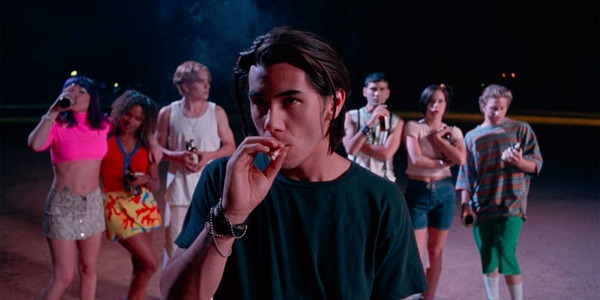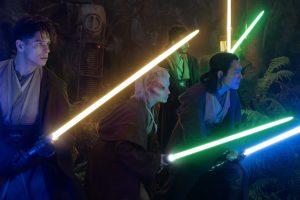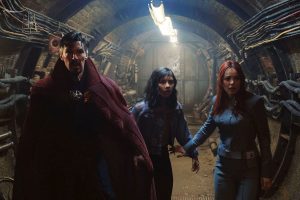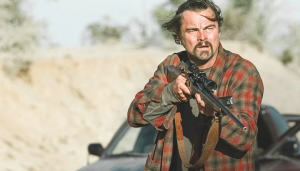
After many months of anticipation since the first announcements of their respective restorations, and further excitement after the official announcement that they were heading to Blu-Ray, Criterion’s release of all three films in Gregg Araki‘s Teen Apocalypse Trilogy is finally upon us. The boutique label has gifted fans (both old and new) of the New Queer Cinema pioneer’s work a stellar set of three of his early, career-defining works: Totally F***ed Up (1993), The Doom Generation (1995), and Nowhere (1997).
To those unfamiliar with the films, Totally F***ed Up follows a group of gay teenagers in Los Angeles across fifteen vignettes exploring their daily lives and inner thoughts, the latter of which are sometimes conveyed through “interviews” one character records. While Totally F***ed Up takes on a more sedated pace, The Doom Generation is far more relentless in narrative and tone, a journey across a hellish American wasteland seen through the eyes of three drifters—Xavier Red (Johnathon Schaech), Jordan White (James Duval), and Amy Blue (Rose McGowan)—as the film depicts their various intersections on the road with brutal violence. The final entry in the trilogy, the kaleidoscopic Nowhere, is an odyssey of sex, drugs, and nihilism chronicling one day in the various exploits of a vast group of teenagers in L.A., at the center of which is Dark (Duval).
Criterion’s release of the trilogy is sourced from the new restorations of all three films, and arrives in a slipbox DigiPack with two of Totally F***ed Up‘s now-iconic blue-text intertitles printed in the slipbox’s yellow interior in red text: “to live and fry in L.A.” and “more teen angst”. The release’s three discs are housed in a case that homages another one of Totally F***ed Up’s intertitles, with the words “start narrative here” and an arrow symbol over a still from Nowhere and “can this world really be as sad as it seems?” over a still from Totally F***ed Up on the case’s front and back covers, respectively. Inside, the discs are held in retention hubs on top of text of “Eat my fuck”, a quote from The Doom Generation, alongside a booklet containing poster artwork for all three films alongside their respective cast and crew credits, a note from Araki himself, and an essay by critic Nathan Lee titled “No Fucks Given”.
Video
Nowhere (1997) — source: Criterion
As noted in the “About the Transfer” section of the booklet, all three restorations were supervised and approved by Araki for release. Totally F***ed Up, the first of the three, is the only one not restored or released in 4K, instead having been restored in 2K from the 16mm original camera negative and provided to viewers on a standard Blu-Ray disc. Meanwhile, The Doom Generation is stated to have been restored from a 35mm interpolative, “with a 35mm answer print used for some scenes”, and Nowhere from the 35mm original negative, “with a 35mm interpositive used for some scenes”, with both housed together on one single 4K Ultra HD Blu-Ray disc as well as an additional standard Blu-Ray disc.
The major pull for many people here will be the fact that none of these films have been made available on the formats before—Totally F***ed Up and Nowhere have only been released on DVD in the past, while The Doom Generation‘s restoration did receive a prior physical release last year from distributor Strand Releasing, but only on standard Blu-Ray. I can certainly say that the Criterion set is well worth the wait.
Right off the bat, Totally F***ed Up makes a great first impression for what viewers can expect from this set. Shot on 16mm (unlike the other two movies, which were shot on 35mm), the Blu-Ray transfer looks about as fantastic as a film of Totally F***ed Up‘s kind can look on the format. The image is crisp and stable, with a substantial amount of grain. Purely from an imagery perspective, it’s not as stylized as its successors—the mundanity of its visuals compliments the characters’ ennui and the transfer further reflects that.
Next up is The Doom Generation. I was excited to revisit this one as I had not seen it in years and highly anticipated the upgrade from DVD to 4K Ultra HD Blu-Ray. During one’s viewing, it will be hard to argue against the movie ever having looked better than it does in its current state, with portions of shots that were not visible in earlier releases now restored for a fuller experience of everything Araki‘s film has to offer on the visual front. Colors look extraordinary too, with the opening club sequence providing an immediate case for this. However, the image was far softer than I was expecting it to be, and while grain is not nonexistent, some shots—wides, mostly—have a smoother, more modern look than others—notably the close-ups. It’s obviously far from a dealbreaker, but I was somewhat disappointed.
The Doom Generation (1995) — source: Criterion
Rounding out the set is Nowhere, which I found to be arguably the best-looking film in the set. Araki notes on the commentary track that the entire movie was retimed from scratch, and it shows—the makeover is spectacular and any comparison to its previous DVD releases will be like night and day. It’s worth noting at this point that none of the films in the set have an HDR option, but it frankly makes no difference to me where a visual masterwork like Nowhere is concerned. Every frame oozes vibrancy and the restoration does a phenomenal job immersing the viewer in the dynamic world Araki crafted from the costumes to the lighting to the sets. The image overall looks incredibly healthy and unobstructed—this is now, without a doubt, the definitive way to view Nowhere.
Audio
As stated in the “About the Transfer” section of the release’s booklet, all three films’ original 5.1 surround soundtracks were remastered from the magnetic tracks. Seefeel’s “Air Eyes”—a selection from Nowhere‘s wide array of licensed music—plays over the discs’ menus, giving viewers a morsel of what to expect on the audio front. Audio plays just as important a role in Araki‘s films as his visuals do—the distinctive dialogue and soundtrack choices are always highlights of his work and this release compliments those points wonderfully.
Totally F***ed Up is the most purely dialogue-driven of the three (and certainly the most naturalistic in this regard), and as such I would say its DTS-HD MA 5.1 track provides a more rigid, somewhat standard impression from an auditory point. Actors’ delivery is generally fairly clear, though the film’s quieter moments are sometimes too understated to make as great an impact as the more discernible ones. Moments that showcase the movie’s industrial soundtrack are where the audio track really kicks into high gear.
Totally F***ed Up (1993) — Source: Criterion
The Doom Generation and Nowhere mark a radical shift from Totally F***ed Up‘s aesthetic and a lot of that arrives out of how dialogue and music are utilized, and this carries over into the Doom Generation/Nowhere discs’ DTS-HD MA 5.1 tracks. From the opening titles of the former intercut with the club scene set to Nine Inch Nails’ pulsating “Heresy”, to the latter’s end credits set to The The’s “Love Is Stronger Than Death”, viewers that have seen both movies before as well as those who have not can pretty easily gauge from the outset that they will maintain a consistency in auditory stability—and they do. Dialogue and sound effects are sharp, and the slew of needle drops from artists such as Slowdive, Cocteau Twins, Lush, Blur, Portishead, Radiohead, and many more (whether the songs are front-and-center or playing subtly in the background) are pronounced enough to make an impact.
Special Features
Various special features are spread across the three discs included in this release. All descriptions below are taken directly from the discs themselves.
Totally F***ed Up Blu-Ray:
Commentary: This commentary track, recorded in 2005, features director Gregg Araki and actors James Duval and Gilbert Luna.
James Duval’s Teen Apocalypse Archive: In this program, recorded in 2024, director Gregg Araki and actor James Duval recall how they met, and the evolution of the Teen Apocalypse Trilogy as they go through boxes from Duval‘s storage unit.
Gregg Araki and Richard Linklater: In this conversation, recorded in 2024, filmmakers Gregg Araki and Richard Linklater reflect on the role of music in Araki‘s creative process, as well as the sociocultural and cinematic landscapes that drove Araki to make his Teen Apocalypse Trilogy in the 1990s.
Designing the End of the World: The following conversations with the cinematographers, production designers, and costumers involved in making the Teen Apocalypse Trilogy reveal the inspirations and craftsmanship that brought director Gregg Araki‘s surreal, apocalyptic visions to life.
The Doom Generation/Nowhere Blu-Ray:
The Doom Generation Commentary: This commentary track, recorded in 2011, features director Gregg Araki and actors Rose McGowan, James Duval, and Johnathon Schaech.
Nowhere Commentary: This commentary track, recorded in 2024, features director Gregg Araki and actors James Duval, Rachel True, Nathan Bexton, Jordan Ladd, Sarah Lassez, Guillermo Diaz, and Jason Simmons.
Academy Museum Q&As: The following Q&As with director Gregg Araki, moderated by filmmakers Gus Van Sant and Andrew Ahn, were recorded at the Academy Museum of Motion Pictures in Los Angeles in 2023.
The Doom Generation Comic Book
Trailers
The Doom Generation/Nowhere 4K UHD Blu-Ray:
The Doom Generation Commentary: This commentary track, recorded in 2011, features director Gregg Araki and actors Rose McGowan, James Duval, and Johnathon Schaech.
Nowhere Commentary: This commentary track, recorded in 2024, features director Gregg Araki and actors James Duval, Rachel True, Nathan Bexton, Jordan Ladd, Sarah Lassez, Guillermo Diaz, and Jason Simmons.
Conclusion
Nowhere (1997) — Source: Criterion
Gregg Araki‘s Teen Apocalypse Trilogy is comprised of three films radically different from one another in style and tone, yet the distinct voice at the helm of each of them remains undeniable. Each work provides insight into the lives of a myriad of characters—some grounded, some comical, but all imbued with Araki‘s unique voice.
The movies themselves have never looked better. Nowhere is the clear standout, but all three transfers of the new restorations provide a worthwhile upgrade from the previous DVD releases, not to mention Criterion has bundled them with a terrific assortment of supplemental features. I can’t imagine anyone not being immensely satisfied with this collection—it looks and sounds amazing, and the packaging is outstanding as well.
Gregg Araki’s Teen Apocalypse Trilogy will be released on September 24, 2024, courtesy of Criterion.
Does content like this matter to you?
Become a Member and support film journalism. Unlock access to all of Film Inquiry`s great articles. Join a community of like-minded readers who are passionate about cinema – get access to our private members Network, give back to independent filmmakers, and more.










